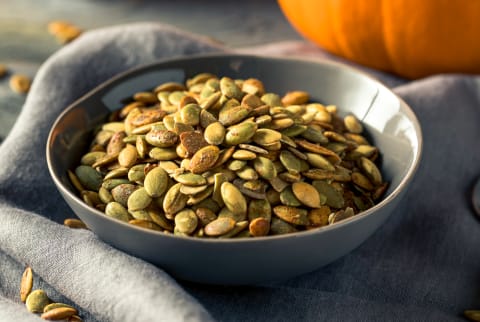A Neuroscientist Says Eating *This* Seed Can Help With The Afternoon Slump


If you find yourself reaching for a cup of coffee around 2 or 3 p.m., we'll wager you're familiar with the afternoon slump. While caffeine may energize you in the moment, it also likely results in another slump (and another cup) later on. Luckily, there may be a surprising alternative to the afternoon caffeine intake, and it even has some mood-boosting benefits.
On a recent episode of the mindbodygreen podcast, clinical neuroscientist psychiatrist Daniel Amen, M.D., author of You, Happier: The 7 Neuroscience Secrets of Feeling Good Based on Your Brain Type, gave us the inside scoop on a tasty (and nutritious) food to help combat that midday sluggishness. Any guesses? We're talking about pumpkin seeds.
Why a neuroscientist loves pumpkin seeds.
"My favorite seeds are pumpkin seeds because they've been found to increase dopamine availability in the brain1," Amen says, thanks to an amino acid called tyrosine. "If you have a lull in the afternoon, pumpkin seeds can help." Not to mention, pumpkin seeds are rich in magnesium, which plays an important role in blood sugar control; that "lull" Amen references is likely a blood sugar crash—so instead of reaching for coffee to temporarily fix the issue, experts recommend keeping your blood sugar levels balanced to avoid the dreaded dip midday.
Pumpkin seeds are high in fiber too, which only adds to their blood-sugar-balancing benefits (as fiber keeps you satiated for longer). Unfortunately, the stats show Americans are only eating about half of what's recommended—that’s 38 grams per day for men and 25 grams for women. Luckily, just an ounce of pumpkin seeds will give you 20% of the recommended daily intake for fiber—however, the shell has more fiber than the seed alone, so consider that when you're looking to consume pumpkin seeds for the fiber benefit.
In addition to their blood-sugar-balancing benefits, pumpkin seeds are high in iron2, with an ounce of seeds offering 11% of the recommended daily intake (not bad for a midday snack). Without enough iron, you may feel fatigued, dizzy, and exhausted3 (similar to the 3 p.m. slump), and considering our bodies don't produce the essential mineral on their own, it's pretty easy to face a gap.
Tasty ways to reap the benefits of pumpkin seeds.
Not only do these powerhouse seeds have essential nutrients, but they're also incredibly versatile and can fit into your diet in countless ways. Some of our favorites? Include the seeds as a crunchy salad ingredient, blend them into a smoothie, sprinkle them on soups, or roast them with some flavorful spices for a simple, crispy snack. Or you can always grab a handful and nibble away—when it comes to recipe inspiration, this seed has quite the range.
The takeaway.
If you need some help pushing through that afternoon energy lull, want to add more fiber to your meals, or potentially lack iron in your day-to-day diet, reach for a handful of pumpkin seeds to help fill these gaps. Sure, a cup of coffee can act as a short-term pick-me-up, but pumpkin seeds fill you up with the nutrients your brain craves.

Hannah Frye is the Assistant Beauty & Health Editor at mindbodygreen. She has a B.S. in journalism and a minor in women’s, gender, and queer studies from California Polytechnic State University, San Luis Obispo. Hannah has written across lifestyle sections including skin care, women’s health, mental health, sustainability, social media trends, and more. She previously interned for Almost 30, a top-rated health and wellness podcast. In her current role, Hannah reports on the latest beauty trends and innovations, women’s health research, brain health news, and plenty more.
